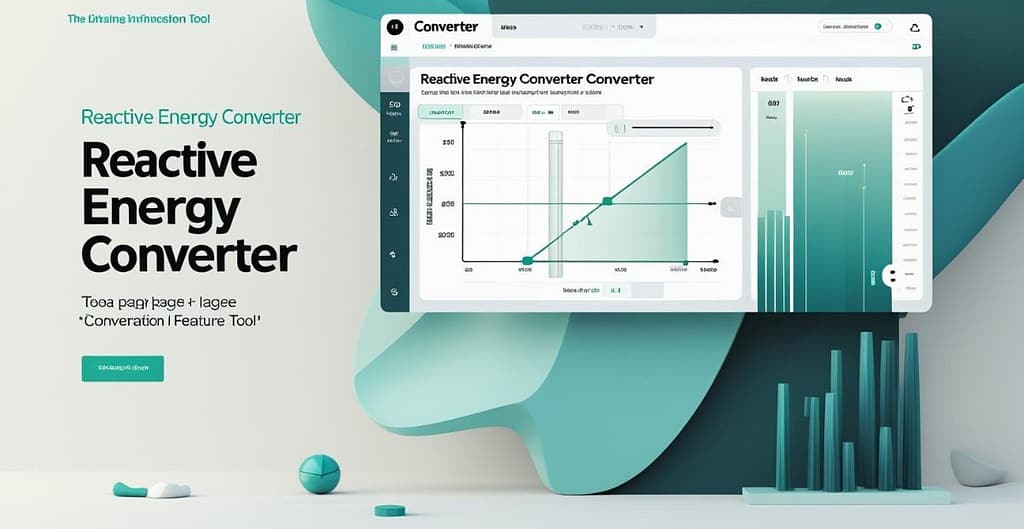Reactive Energy Converter: VARh, kVARh, and MVARh Calculator
Easily convert between VARh, kVARh, and MVARh units with our powerful online calculator. Essential tool for electrical engineers, technicians, and students working with reactive energy calculations.
Reactive Energy Converter
Convert between VARh, kVARh, and MVARh units
Understanding Reactive Energy and Its Importance
In electrical power systems, reactive energy is a crucial concept that represents the energy component associated with the establishment and collapse of magnetic and electric fields in AC circuits. It’s measured in volt-ampere reactive hours (VARh) and is essential for understanding power quality and efficiency.
What is Reactive Energy?
Reactive energy is the component of electricity that does not perform actual work but is necessary for the operation of electromagnetic equipment like transformers, motors, and solenoids. Unlike active energy (measured in kWh), reactive energy is measured in VARh (volt-ampere reactive hours).
Why Convert Between VARh, kVARh, and MVARh?
Electrical systems operate at different scales, from small electronic devices to massive power grids. The Reactive Energy Converter allows professionals to easily switch between units:
- VARh (Volt-Ampere Reactive Hours) for small-scale applications
- kVARh (Kilovolt-Ampere Reactive Hours = 1,000 VARh) for medium-scale systems
- MVARh (Megavolt-Ampere Reactive Hours = 1,000,000 VARh) for large power systems
Applications of Reactive Energy Calculations
Understanding and converting reactive energy is crucial for:
- Power factor correction and optimization
- Billing for industrial electricity consumption
- Designing capacitor banks for reactive power compensation
- Analyzing power quality issues
- Energy efficiency assessments
How Our Reactive Energy Converter Works
Our Reactive Energy Converter tool uses precise conversion factors to ensure accurate results. The conversion follows these principles:
- 1 kVARh = 1,000 VARh
- 1 MVARh = 1,000 kVARh = 1,000,000 VARh
Simply enter your value, select the source unit and target unit, and our calculator will instantly provide the converted value with high precision.
Frequently Asked Questions About Reactive Energy Conversion
Active energy (measured in kWh) is the actual energy consumed to perform work like lighting, heating, and mechanical motion. Reactive energy (measured in VARh) is the energy required to establish electromagnetic fields in inductive equipment but doesn’t perform actual work. Both are essential components of electrical power systems.
Reactive energy is crucial because it affects voltage levels, system stability, and power quality. While it doesn’t perform useful work, it’s necessary for the operation of transformers, motors, and other electromagnetic devices. Proper management of reactive energy through power factor correction can reduce energy losses and improve system efficiency.
Reactive energy is measured using specialized meters that can distinguish between active and reactive power components. Many industrial electricity tariffs include charges for reactive energy consumption, especially when the power factor falls below a specified threshold (often 0.9-0.95). This encourages businesses to maintain good power factor through compensation techniques.
MVARh (Megavolt-Ampere Reactive Hours) is typically used for very large power systems like electrical grids, large power plants, and major substations. kVARh is used for medium-scale applications like industrial facilities and commercial buildings, while VARh is used for smaller electronic devices and component-level analysis.
Reactive energy consumption can be reduced through power factor correction techniques, primarily by installing capacitor banks that supply reactive power locally. This reduces the reactive power drawn from the grid, improves voltage stability, reduces energy losses, and can lower electricity costs by avoiding penalties for poor power factor.

Use our more free tools at earnapki.com
Apparent Power Converter
Reactive Power Converter
Parts Per Converter
QR Code Generator